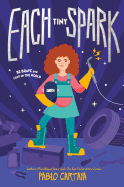
Twelve-year-old Emilia is going through a period of transition. Her father is coming back from deployment and her mother is leaving for a job interview in San Francisco. She'll be gone only for a week, but Emilia, who has Inattentive Type ADHD and sometimes has "a hard time organizing and paying attention," relies upon her mother to help her plan her school work. Abuela (her papi's mother) lives with them, but Emilia knows she won't get the same kind of support from Abuela that she gets from Mom. Also, Papi has been gone for almost a year. "We hardly ever spoke the whole time he was away," Emilia thinks, and she's sore because, even though she sent him tons of video messages, he never responded. "It feels like my whole life is changing. Like everything that's normal is becoming the opposite." Then, Emilia is assigned a school project to create a visitor's guide for Merryville. As she begins learning the history of her city, her eyes are opened to the inequity all around her.
Pura Belpré Honor-winner Pablo Cartaya (The Epic Fail of Arturo Zamora) confidently and expertly shows in Each Tiny Spark how politics are inextricable from the personal. Emilia's Cuban-American family, which speaks a mix of Spanish and English, deals with racial and religious politics every day. Religion and colorism, PTSD and neurodivergence, racism... all of it is personal and all of it affects Emilia directly. Cartaya's fluid text never shows the work that must have been involved in so consciously building a world that reads this true. Each Tiny Spark is an elegantly wrought middle-grade novel that has the potential to speak directly to any reader. --Siân Gaetano, children's and YA editor, Shelf Awareness

